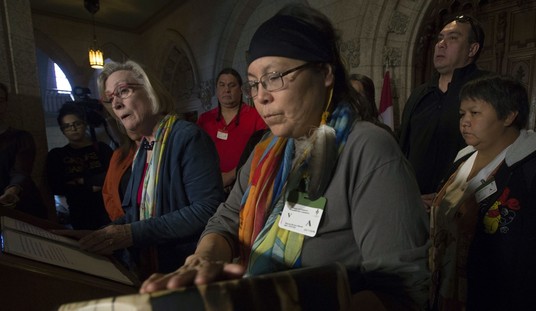Even when they sharply criticize yours truly, I have tried in recent years to avoid getting unduly exercised over individual posts at other sites. They have their views, I have mine. It’s a (mostly) free country (for now).
Unfortunately, I must carve out an exception to that stance because the individual objecting to my most recent PJM column (“October 14, 2008: The Day the Economy as We Knew It Died”): a) has accused me of “bald lies” while failing to successfully identify one; b) did so without having the integrity or basic decency to name me; c) criticized a column which deliberately focused on a narrow two-week time frame as “a particularly odious and sickening piece of crap” without the faintest understanding of my full take on the government-led, bank-assisted, political corruption-driven financial crisis we face and the several decades of history which led to it (completely irrelevant to this column, which will exclusively address the absence of “utter falsehood”); and d) deliberately made it about more than my work by indicating that “these people (in context: ‘at Pajamas Media’) need to be exposed as the liars they are.”
The critique in question, “Bald LIES From The Right (This Is IMPORTANT),” was published Friday evening at Market-Ticker.org by Karl Denninger, who is also a frequent contributor at the leading and highly regarded financial website Seeking Alpha. Denninger has a hard-earned reputation as a no-holds-barred commentator. Though I disagree with him strongly on occasion (e.g., his extraordinarily uncharitable “nothing of societal value” attack on the accomplishments of Steve Jobs and Apple), I also frequently agree with him. His Saturday afternoon item on GOP presidential candidate Herman Cain’s “999 Plan” is just one such instance. His attack on my column and PJM is obviously not.
I will show that, unless the sources I referenced totally made up their stories out of thin air, no sentence Denninger specifically criticized could possibly be construed to contain, in his words, “utter falsehood.”
The first three of four paragraphs Denninger excerpted followed my quote of part of the text of a CNBC exchange (video here) between Dylan Ratigan and Charles Gasparino. Twice, Gasparino described the October 14, 2008 meeting between Treasury Secretary Hank Paulson and the CEOs of the nation’s largest banks, during which the CEOs “agreed” to direct government “investment” (i.e., partial ownership and de facto control), as done with a “gun to the head.” Here’s what I wrote:
The “gun to the head” was obvious: “You really have a nice bank there. But if you walk out without signing this document, right here, right now, we will bring all of the regulatory and law-enforcement powers of the United States government to bear on your institution. Your depositors and shareholders will suffer immensely. Your bank won’t survive. It would really be a shame if that were to happen. But we promise you, it will.”
What I wrote is my interpretation of what happened in that room, based on what CNBC, the New York Times, to a lesser extent the Associated Press (which watered it down to, “Paulson basically told the bank CEOs that they had to accept the government stock purchases for the good of the U.S. economy”), and precious few others reported. The Times even described Godfather Paulson’s “proposal” as “an offer the banks could not refuse.” My interpretation based on what is known sure as hell isn’t “utter falsehood.”
Next, I wrote the following about a provision in the TARP legislation that became law eleven days earlier which permitted the Treasury secretary to buy “any other financial instrument” in achieving the law’s goals:
Hank Paulson’s defenders will probably claim that provision (B) above gave him authorization to do what he did, and that the preferred shares the banks were forced to issue count as “financial instruments.” The problem with that “logic” is that these weren’t “purchases.” They were extorted ownership interests — and in case you’re wondering, there is no authorization to extort anywhere in the legislation.
Again, if there’s evidence that all the banks willingly jumped up and said okey-dokey without coercion, I’d like to see it. Otherwise, what I wrote is an opinion based on the clearly understood difference between a willing seller-willing buyer transaction and one based on implicit and explicit threats. It sure as hell isn’t “utter falsehood.”
The next paragraph is clearly an expressed opinion. As much as Karl may not like it, I’m entitled to it, and it sure as hell has no “utter falsehood” component:
The economy as we knew it died that day — and virtually no one objected. As Michelle Malkin wrote: “If you don’t feel like throwing up today, you’re not paying attention.”
I wrote that paragraph because in my view (which Michelle at least generally shared) what happened three years ago on October 14 represented a pivotal turning point for the worse in our economic history:
- It was, as far as I know, the first instance, and certainly the first on such a large scale, where the government deliberately and under threat of force took effective ownership and control of an entire industry sector, not just its failures.
- It directly defied the clearly understood intent (and, I would argue, the hardwired provisions) of the TARP law passed only eleven days earlier.
- It was greeted with near silence by the political class, the press which knew how different Paulson’s actions were from the law’s intent, and the public at large.
The fact that the large majority of TARP funding has been repaid hardly represents an exoneration of what Paulson did. His action — again, I must emphasize, “with President George W. Bush’s shameful capitalism-betraying acquiescence” — gave cover to all manner of subsequent longer-lasting government moves towards tyranny (“arbitrary or unrestrained exercise of power; despotic abuse of authority”), including but by no means limited to the use of TARP funds to bail out General Motors and Chrysler (which Congress, at least publicly, never originally intended), while arbitrarily and extralegally divvying up the spoils; the government’s outright takeover of student loans; the Dodd-Frank legislation, which, as I wrote in the run-up to its passage, is a massive power grab giving the government nearly unquestioned power to shut down any financial institution any time it likes; and pervasive regulatory overreach like we haven’t seen since the economically depressed 1930s.
The final paragraph with which Denninger takes issue is also the column’s finale:
Even beyond what we can see with regulations gone wild, failed stimulus, and outright corruption, our government’s authoritarian overhang and its destructive psychological effect on business and investor behavior largely explain why the economy won’t acceptably grow.
Denninger wrathfully writes: “If you believe one word of that paragraph you’re dumber than a box of rocks.”
Rock on this, Karl: It sure as hell isn’t an “utter falsehood” — and for heaven’s sake, please note that in my view the government influences cited “largely explain” why the economy won’t grow — not by any stretch exclusively, or even nearly exclusively. Plenty of individuals, businesses, government institutions, politicians, and government officials — including Hank Paulson, both before and during his Treasury tenure — are deserving of properly allocated blame for the conditions which led to our currently stuck in neutral (at best) economy. The column was about how the legislated TARP was not the Paulson-executed TARP, and how the Paulson-executed TARP was a tragic, possibly point-of-no-return authoritarian first.
Thus, the column contains no “utter falsehoods.” I try my damnedest not to write ’em, and I can attest from experience that the editors at PJM try their damnedest to prevent ’em from getting published.
Karl Denninger owes us — myself and Pajamas Media — nothing short of an unconditional apology. The proper words are: “I was wrong. I am sorry. I will appropriately retract.” Period. From my standpoint, there’s no chance of any kind of dialog about the rest of the content at your post — which might otherwise be quite worthy of discussion — until I get one.









Join the conversation as a VIP Member